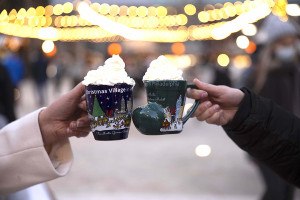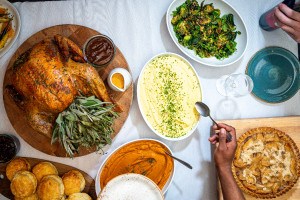Your Brother Is Your Keeper, And Your Cook: Buleleng to Lake Poso
Yesterday, we had Part 1 of Trey Popp’s adventures in Sulawesi–a continuation of the story he began in this month’s Revisit column about the idiosyncratic South Philly Indonesian workingman’s cafe Hardena Waroeng Surabaya Restaurant. Today, he finishes his tale of exploration, minor celebrity and the things that happen when travel plans go a little bit awry…
At four in the morning we were discovered by four young men with flashlights who were, to our distress, very much in the mood for conversation. We discouraged their curiosity and fell back to sleep, thinking that was the end of it. When the men returned at 6 a.m., they came with twenty more people. Welcome to morning in Sulawesi.
As we packed up, Olivia demonstrated her headlamp for the crowd.
“Aha!” one exclaimed. “It was you who scared her last night!” He pointed to the woman Olivia had encountered in the night. She stared at us and said nothing.
I have never entered a town like we entered Buleleng. The village consisted of a single dirt road lined with colorful wooden houses and wandering fowl. By the time we arrived, the crowd of twenty had swelled to double or triple that size. Everyone who wasn’t already walking with us came out of his house to stare.
I asked one of the men if we could catch a truck out of Buleleng.
“Tidak ada!” he replied. No truck. “We will get a truck in the year 2000,” he added in heavily accented Indonesian. (While most adults speak the national language, Bahasa Indonesia, it is learned in school and is seldom their first language. Abdul had spoken Bugis. This man’s mother tongue was a dialect of Bungku.)
“Is there a store where we can buy food?”
“Ada.” Yes. “Biscuits.”
We were led there and invited in by the crowd. It was a very modest store. Olivia picked out some crackers and a tin of condensed milk from the shelves. I counted 37 people who had squeezed into the room. More stood in the door and windows. We asked if we might be able to get some rice and noodles for breakfast, and magically some arrived. The village, of course, watched us eat.
Olivia lit a cigarette—uncommon behavior for a woman in Indonesia. A boy in the doorway gaped in disbelief, his jaw hanging open wide enough to fit a grapefruit.
An ancient blind man was led into the room and he shook my hand. Then kept shaking it. He didn’t let go for a full minute, during which time he stood, holding me in place, and spoke gibberish. I know it was gibberish because the 37 other people in the room were all holding their index fingers against their foreheads in a diagonal position and mouthing the word gila—a gesture that denotes lunacy in Indonesia.
It eventually came out that he wanted to hear us speak English. Olivia and I didn’t know quite what to say, so I told jokes. Two of them—realizing only halfway through the second that its punch line was visual in nature and, therefore, not the best material to be performing for the blind. The man seemed to enjoy it anyway. Olivia recited the first paragraph of Lolita from memory and the man modified it in gibberish. Everyone laughed and held their fingers against their foreheads.
After breakfast we walked to another house, where we were treated to tea, coconut water (which the man of the house scurried up a tree to retrieve), and an even thicker crowd. Our host proclaimed his joy over and over.
“Banyak orang senang!” he kept on saying. So many people happy!
“In one month,” I finally asked, “how many travelers come to Buleleng?”
“None.”
“How many have come in the last year?”
“None!” he exclaimed. “You are the first! We are so happy to see you!”
There being no truck in Buleling, our host suggested that we walk another four miles to Lafeu because maybe in Lafeu there would be a truck. Or a boat. Or maybe not. Unexpectedly, we had arrived at the coast, but we still needed to get to Bungku.
The towns in between us and Lake Poso continued to multiply.
We marched on to Lafeu, skirting an impossibly test-tube blue bay. Lafeu was laid out along another bay. Some of its houses stood on stilts above the water, and we were invited into one of them. Tea and biscuits arrived immediately and, per standard operating procedure, half the town came in to watch us eat.
One of the men in the crowd said that a truck would presently be arriving from Bungku and would then be returning in that direction. Maybe we could catch a ride. We walked to the Lafeu police station and waited for the vehicle, standing with the town’s sole policeman—a man named Franz Willem, descended from Portuguese traders. As his wife served us more tea and papaya spiced with lemon juice and chili peppers, the truck’s departure time was pushed further and further back. In the end, it did not leave at all. Franz offered the police station as overnight quarters for us, but one of our new friends, a 33-year-old man named Sudirman, insisted that we eat and sleep with his family. The most lasting reward of hard travel is the lesson it forces upon you at every turn: That your brother really is your keeper.
Sudirman and Betje were two of the most pleasant people we had met yet, and their hospitality did not stop at the dinner table. After Sudirman took us to a stream for a much-needed bath, Betje combed out Olivia’s hair, braided it, and kept the hair caught in the brush bristles as a souvenir. Sudirman’s entire extended family came over after dinner (fish and rice) to take in the spectacle we presented, and most of them stayed right up until we laid down on the living room floor, watching us close our eyes and sticking around for our first half-hour of feigned sleep.
In the middle of the night both of us were woken up by a sound we could not identify. I was sure that there were chickens pecking at the thatched roof. Olivia was convinced that Sudirman and Betje were weaving baskets in the next room.
Both of us were wrong. What we were hearing was the return of the tide under the stilts, bringing waves that banged around beneath us in the night, slowly but surely putting us back to sleep.
The next morning the roosters crowed at the normal time (dawn) and volume (loud), and we rode to Bungku in a truck full of cacao beans and dried fish. The truck belonged to a man named Mustafa who, along with his wife, was using it to open up what amounted to a new trade route to the area we had just traversed on foot. In a way, this promised to transform the area more radically than black-market timber clearing. Their truck—rumors of which had reached all the hamlets that had given us food and shelter over the past days—was slowly converting a subsistence economy into a monetary one. On this day, countless trading stops and a blown tire stretched the journey into a ten-hour affair. When we reached Bungku, all the outbound buses had already departed.
As in Lamonae, Buleleng, and Lafeu, there was no hotel in Bungku. Mustafa graciously invited us to stay with his family. We were given the childrens’ room where, at one in the morning, rats emerged—of sufficient size and in sufficient number to actually shake the elevated bed in which we lay. All throughout the house, their nocturnal activity rattled dishes and the contents of shelves, as though a subway train were passing just beyond the outer wall. It wasn’t long before one of the rats made it through our mosquito net and hurled itself into my back before ricocheting off into the darkness. Olivia and I clutched one another in fright and horror. The children we had displaced were sleeping unprotected on the floor.
In the morning, Mustafa mentioned that the Indonesian rupiah was trading at 9,000 to the US dollar. This represented a 20 percent drop in value from a week before, when last we had seen a bank or newspaper. We could only assume that East Timor had come apart at the seams. The next day, after crossing into the Christian highlands, we heard rumors that a church full of civilians had been slaughtered.
But to get to that point we still had another full day of travel from Bungku to Lake Poso, making it a week of constant travel by boat, jeep, bus, truck, and foot. We arrived in the peaceful lakeside missionary village of Tentena after dark, and for the first time in five days we bought a meal in a restaurant. We paid for a place to sleep. I have no memory or written record of what we ate that night. Sleep, when it came, was deep and uninterrupted.
The following day was Sunday, and we woke to the sounds of church bells and choir song.


